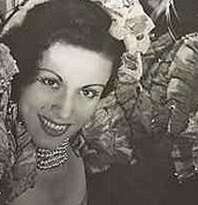Margarita Lecuona
Margarita Lecuona (1910–1981) was a Cuban singer and composer who is remembered for composing Afro songs such as "Babalú" and "Tabú".[1][2]

Biography
Born in Havana on 18 April 1910, Lecuona was the daughter of Eugenio Lecuona, the Cuban consul in New York. She attended the Colegio Nuestra Señora de las Mercedes and the Colegio Sepúlveda in Havana before embarking on her secondary education at the Instituto de La Habana which she left after her first two years.[2] She studied singing under Julia Lucignani and the piano under Eulalia Santana before attending the Escuela de Guitarra de Pro-Arte Musical to study the guitar under Clara Romero de Nicola. She studied dance at the Escuela de Ballet under the ballet master Nikolai Yavorsky, performing in a number of his works.[1]
In 1930, while still studying, she wrote "Soñadora" which she sang playing the guitar.[2] After performing in a number of stage productions, in 1942, she first created a duo with Olga Luque and then a group called the Lecuona Cuban Girls, performing on stage and on the radio. Among her many compositions in the early 1940s were "Tabú" and "Babalú". "Tabú" gained popularity when sung by Arthur Lyman and Les Baxter while "Babalú" proved successful with the singer Desi Arnaz.[3]
She went on to marry the Argentine actor Pepe Armil in 1947 and moved to Buenos Aires where she settled in 1957. From there she travelled to Chile, Uruguay Bolivia, Peru, Brazil and Mexico, performing on radio as well as on the stage.[1]
In 1969, she joined her family in the United States. She died in New Jersey in 1981.[2]
References
- Fajardo, Ramón (18 August 2017). "Margarita Lecuona" (in Spanish). Habana Radio. Retrieved 5 September 2017.
- "Margarita Lecuona" (in Spanish). Ecured. Retrieved 5 September 2017.
- Adinolfi, Francesco (2008). Mondo Exotica: Sounds, Visions, Obsessions of the Cocktail Generation. Duke University Press. pp. 165–. ISBN 0-8223-8908-8.